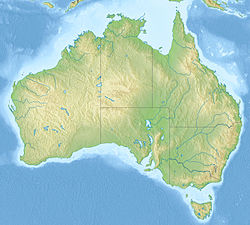| Marree Subgroup | |
|---|---|
| Stratigraphic range: Aptian-Albian | |
| Type | Subgroup |
| Unit of | Rolling Downs Group |
| Sub-units | Bellinger Sandstone, Bulldog Shale, Coorikiana Sandstone, Oodnadatta Formation |
| Underlies | Mackunda & Winton Formations |
| Overlies | Parabarana Sandstone, Cadna-owie Formation |
| Lithology | |
| Primary | Siltstone |
| Other | Gravel, conglomerate, shale, clay |
| Location | |
| Coordinates | 30°26′0″S 137°10′0″E / 30.43333°S 137.16667°E / -30.43333; 137.16667 |
| Approximate paleocoordinates | 57°06′S 117°18′E / 57.1°S 117.3°E / -57.1; 117.3 |
| Region | South Australia |
| Country | |
| Extent | Eromanga Basin |
| Type section | |
| Named for | Marree |
| Named by | Forbes |
| Year defined | 1966 |
 | |
The Marree Subgroup, previously described as Maree Formation and Marree Formation, is a geological subgroup in the Eromanga Basin of South Australia whose strata date back to the Aptian. The subgroup was first described as a formation by Forbes in 1966. Dinosaur remains are among the fossils that have been recovered from the formation.
An opalised plesiosaur specimen of the genus Umoonasaurus has been nicknamed 'Eric' and was described in 1998 by Schroeder. The decapod crab Dioratiopus salebrosus was described in 1980.
Vertebrate paleofauna
Indeterminate theropod remains present in Western Australia.
Dinosaurs
| Dinosaurs of the Marree Subgroup | ||||
|---|---|---|---|---|
| Genus | Species | Presence | Notes | Images |
|
K. kujani |
Geographically present in Western Australia, Australia. |
"Hindlimb." |
||
Sauropterygians
| Sauropterygians of the Marree Subgroup | ||||
|---|---|---|---|---|
| Genus | Species | Presence | Notes | Images |
|
U. demoscyllus |
Bulldog Shale of northern South Australia. |
Known from an opalized skeleton nicknamed 'Eric'. |
 | |
See also
References
- ^ Weishampel, David B; et al. (2004). "Dinosaur distribution (Early Cretaceous, Australasia)." In: Weishampel, David B.; Dodson, Peter; and Osmólska, Halszka (eds.): The Dinosauria, 2nd, Berkeley: University of California Press. Pp. 573-574. ISBN 0-520-24209-2.
- 1988 - Tanh Van Doan - Sedimentology and mineralogy of some Jurassic-Cretaceous sediments of the southern Eromanga Basin - MSc. thesis
- "Marree Subgroup". Australian Stratigraphic Units Database. Geoscience Australia and Australian Stratigraphy Commission. Retrieved 23 August 2018.
- 1999 - Recent developments in Australasian sauropterygian palaeontology (Reptilia: Sauropterygia) - Records of the Western Australian Museum Supplement No. 57: 201-205
- Wooldridge Creek, Alberga River at Fossilworks.org
- "Table 4.1," in Weishampel, et al. (2004). Page 76.
- ^ Kear; Schroeder; Lee, Benjamin P; Natalie I; Michael S. Y (2006). "An archaic crested plesiosaur in opal from the Lower Cretaceous high-latitude deposits of Australia". Biology Letters. 2 (4): 615–619. doi:10.1098/rsbl.2006.0504. PMC 1833998. PMID 17148303.
{{cite journal}}: CS1 maint: multiple names: authors list (link)
Further reading
- Schroeder, N. (1998). A review of order Pliosauria, and the description of a new, opalised pliosauroid, from the Early Cretaceous of Coober Pedy, South Australia. M.Sc. thesis, Monash University, Clayton, Victoria
- M. F. Glaessner. 1980. New Cretaceous and Tertiary crabs (Crustacea: Brachyura) from Australia and New Zealand. Transactions of the Royal Society of South Australia 104(6):171-192